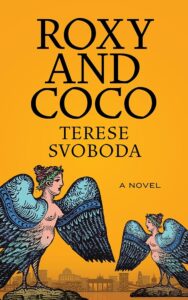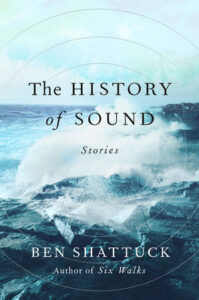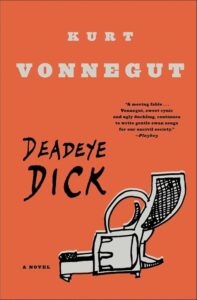Curated by SAM SPRATFORD
The summer is waning, and here at The Common, we’re soaking in the quiet moments before the final stretch of production for our fall issue. Read on for recommendations from JAY BOSS RUBIN, EMILY EVERETT, and myself, for three pithy books that can help stretch out the season’s end.
Terese Svoboda’s Roxy and Coco: recommended by TC Online Contributor Jay Boss Rubin
“No one lives forever, stuffed or otherwise,” Terese Svoboda reminds readers one-third of the way into her highly anticipated new novel, which she actually began in 2011. But Roxy and Coco, the novel’s eponymous sisters, live longer than most—they are harpies, and from their high-flying vantage, King Minos of Crete and Eleanor Roosevelt are near contemporaries. Harpies (half human, half bird) are neither mythological nor immortal, we are told. They’re endangered. In order to survive, they’re increasingly able to disguise themselves as humans, which enables harpies such as Roxy and Coco to work for Child Protective Services, where they rescue the abused and smite the abusers.
This wildly inventive premise is only one reason to read Roxy and Coco, Svoboda’s seventh novel, and her twenty-third book in total (Svoboda is also a TC contributor). Equally attractive is her propulsive prose, which has its roots in her practice as a poet. Take this description of flying, which convincingly blends the avian perspective with the human: “I lean into the current, not flapping, not diving, the upside of the earth palm-open under me. I forget, every time, the thrill and beauty of soaring. I must always forget or I’d never spend ten minutes on earth, stuck upright on such heavy feet, plodding forward.” Or consider Roxy’s translation of Coco’s bird song, which previews the central tension between the otherwise-inseparable sisters: “Not that sparrows sing very well. Actually [Coco] doesn’t either, she shrieks. And her lyrics? Fuck-me, fuck-me. Courtship is getting to her.” Svoboda is a master of omission. Not all plot points require direct disclosure via ink. An all-important egg can be found, or not found, in the blank space on the page between chapters. Just as harpies are hybrid creatures, Roxy and Coco combines the thrill of a caper and the complexity of fine art. Svoboda’s view of human nature is ambiguous: not exactly bleak, but by the novel’s end I was convinced we could all use a little more bird in us.
Ben Shattuck’s The History of Sound; recommended by Managing Editor Emily Everett
Ben’s Issue 16 story “The History of Sound” is legend at The Common; it won the magazine’s first ever Pushcart Prize in 2019, and then was optioned for a film starring Paul Mescal and Josh O’Connor (out next year, you bet we’re going!). Ben did the screenwriting himself. But it was also the only story of Ben’s I’d ever read, since his two other pieces in The Common were nonfiction. I was so excited to dive into more of his fiction in his full-length story collection, which came out from Viking in July. And it hasn’t disappointed! Ben writes beautifully about New England, but especially about New Englanders—trying to connect, failing, or succeeding, if only for a moment. Dealing with grief, loneliness, art-making, disappointment, addiction, and a million other small human struggles. My favorites are the more historical stories, which are so completely transporting that I can’t listen to the audiobook when I’m driving. Some historical fiction can feel drafty and frail, like those old slanting barns you sometimes drive by in rural Massachusetts: the shape of the original thing, but not the real, full-blooded, functional reality of it. But in Ben’s hands, these historical stories feel both otherworldly and completely of our world, just a thin veil between us and the rich snapshots of life in decades and centuries past.
Bonus rec: check out the audiobook, which includes narrators like Chris Cooper, Nick Offerman, Paul Mescal, Jenny Slate, and, of course, Ben himself.
Kurt Vonnegut’s Deadeye Dick; recommended by Literary Editorial Fellow Sam Spratford
The namesake of Deadeye Dick is Rudy Walz—the son of a fraud-painter father, the accidental murderer of a pregnant woman at age 12, and the narrator of the book, which is his life story. In just 240 freewheeling pages, punctuated by short and often disjointed blocks of text, Rudy observes his upbringing in a medieval Germanic-style art studio in Midland City, Ohio; his father’s friendship with Hitler, and his subsequent descent into infamy after the war hit; the drug-addled rise and fall of his brother’s career as a TV executive; his mother’s death by radiation poisoning; and a neutron bomb that makes Midland City a ghost town. He even observes things he never saw, like the day his father’s painting teacher was accidentally beheaded, or, on the first page, the moment he was born: “A little peephole opened quite suddenly. Light and sound poured in. Voices began to describe me and my surroundings. Nothing they said could be appealed.”
Vonnegut creates his narrators in his own image—Midwestern, military-adjacent, and brutally honest observers, though very rarely out loud. It is remarkable how little we know about Rudy himself for a book that is framed as his life story. For the record, Rudy seems to think that “A story … is as artificial as a mechanical bucking bronco in a drinking establishment.” Instead of pasting his observations together with reflection, Rudy uses platitudes to endcap his narration – phrases like “And so it is” and “Waste not, want not” and “He was quite the Bohemian!” His narrator also equivocates seemingly compulsively—always “may”-ing and “often”-ing and “perhaps”-ing—which I think serves a similar self-effacing purpose.
Earlier this summer I remarked to a friend about the necessity of “empty” language. I think the word that prompted this was “awesome,” a modifier and interjection we both fall back on often. I observed to them that “awesome” does not mean anything to me, and yet it does not feel alienating to say or hear. At that time, I described it like a container, something I toss out into a conversation to catch a stray observation or affect. I remember them making some kind of pensive “huh” sound and moving on; I don’t really know if they agreed with me. But after reading Deadeye Dick, I’d like to think Vonnegut might.
Rudy’s final words are this: “You want to know something? We are still in the Dark Ages. The Dark Ages—they haven’t ended yet.” It is not clear exactly what he means; is simply the final platitude to cap off the countless prior platitudes; it is Vonnegut via Rudy Walz gesturing to say, “Look at what I’ve lived. Now, don’t you see?” My friend has read this book, so I will tell them now that this is what I’m really doing with the word “awesome”—asking them to recognize themselves in whatever I was just saying, which I think is the basis of understanding. And so I think that underlying Deadeye Dick is a significant act of faith, a reaching-through the holes of the signifier right through to the thing itself. A faith in the understanding we create by saying nothing. A faith that we may acknowledge one another, despite our alienation. And atheist though he may be, Vonnegut is far from faithless.






